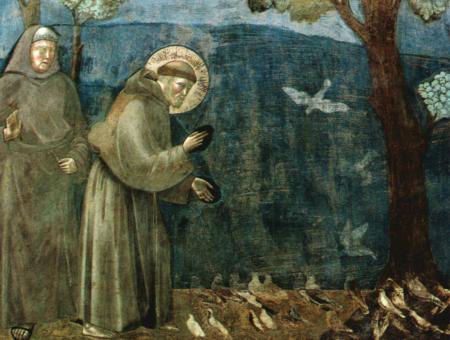The pleasure of the saints
Life is filled with illusions. An illusion is when something persists in seeming other than it is. Despite everything we "know" about how it actually is, and despite all our efforts to "force" it to appear the right way, it continues to look other than it is.
Optical illusions are a great example. They are so vivid and astounding, that we collect them in books and on websites. But besides optical illusions, there are what might be called "practical illusions," where in order to do something correctly and well, we have to dismiss appearances, and rely on what we have reasoned to be the actual condition of what we are dealing with.
Some "practical illusions" are trivial, such as "golfer's parallax," when the ball, as you are standing alongside it, looks like it needs to go in a different direction, from what was clearly the case when you were standing behind or above it.
Other such illusions are highly important. Think of the saying, "each of us in the marriage contributed 60 percent." Or, precisely those cases in which we are most convinced that the other person should apologize first is usually when we should do so. Well, Our Lord said famously that what in reality is only a splinter in someone else can look as though it's a log.
The whole interior life involves dealing with illusions. We live forever; an eternal good is infinitely more valuable than a finite good. This we know. But why does it persist in seeming that, say, reading one's email for the 10th time in the morning is more important than morning prayer?
Not surprisingly, pleasure is an aspect of our life most bedeviled with illusion. Some of the things people find most pleasant, are probably not pleasures at all. Consider the bitterness and sorrow, for you or for someone else, that went along with that first sin of a certain kind. A true insight into the nature of the deed? Probably. And yet perhaps that very same deed has since come to seem extremely pleasant, and not because the nature of the deed has changed, or because the doer has become a more perceptive judge.
Something we can know, as well as we can know that an oar remains straight and does not break in two when it is placed in water, is that the greatest pleasure is that which is inherent in the life of God. He is and has infinite good for all eternity. He is never weary, deprived, hindered, dissipated, or broken. Of course divine activity and divine life is the greatest, best, and most pleasant. Even the pagan philosophers knew this. Listen to old Aristotle: the life of God is "a life such as the best which we enjoy, and enjoy for but a short time ... if God is always in that good state in which we sometimes are, this compels our wonder; and if in a better this compels it yet more. And God is in a better state."
But pleasure is infectious, and, when someone we love is present with us, we share in his pleasure. So then something else we know, is that a person who shares in divine life ("state of grace"), and is a friend of God, will, in the presence of God, share also in the greatest pleasure. As St. Thomas Aquinas taught, "spiritual pleasures are the greatest of all pleasures," although most people, he said, do not think so, because they have little experience of them.
These reflections came to mind when recently I returned to reading "The Little Flowers of St. Francis," an account of St. Francis' life and his first followers. In my first reading, many years ago, I was impressed by the self-denial and asceticism of the friars, such as their keeping a second 6-week period of rigorous penance, what was called the "Lent of St. Michael," from the feast of the Assumption to Sept. 29.
But this time through I was impressed by descriptions of the ecstatic joy that the friars found in God. One could choose many expressions, but consider how the friars are described as "rapt": "St. Francis began to speak of God so sweetly, so sublimely, and in a manner so wonderful, that the grace of God visited them abundantly, and all were rapt in Christ"... "Brother Bernard was often rapt in God through the contemplation of celestial things" ... "for a whole day and night he was rapt in God" ... "as Brother Leo was in prayer by St Francis' bedside, he was rapt in ecstasy" ... "On one occasion, as he was thus rapt in God, and insensible to the world, his heart was so burning with divine love that his bodily senses were dead to all things external." And so on. This expression, "rapt in God," is beautiful for making clear that the pleasure is not sought as something subjective but found in, and because of, God.
Now these early Franciscan saints are extraordinary, to be sure. And a layperson can hardly afford to neglect his duties from becoming "rapt in God" for a whole day. But that we need to discover the pleasures of friendship with Christ, this is clear. And just maybe, too, apostolic fervor, and the spread of Christianity, have something to do with our somehow being "rapt in God," as contemplatives in the midst of the world.
MICHAEL PAKALUK IS A PROFESSOR OF PHILOSOPHY AT AVE MARIA UNIVERSITY.
- Michael Pakaluk is Professor of Ethics and Social Philosophy in the Busch School of Business at The Catholic University of America. His book on the gospel of Mark, ‘‘The Memoirs of St. Peter,’’ is available from Regnery Gateway.



















